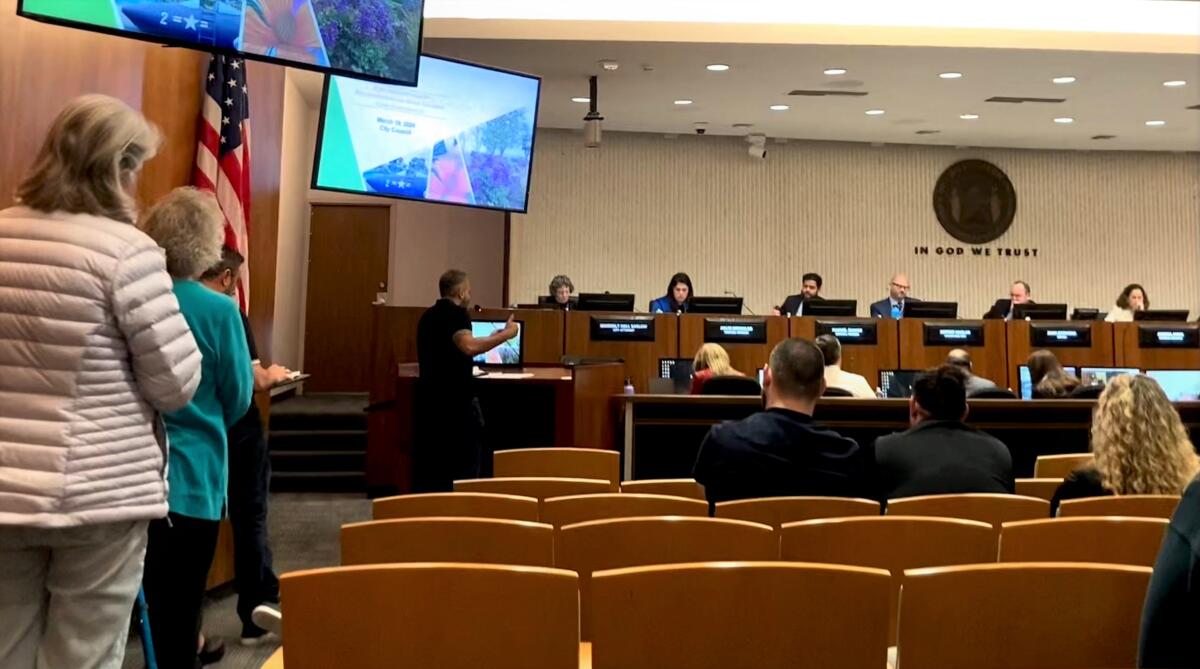Costa Mesa City Council takes red pen to cannabis ordinance, but edits may need refining

An hours-long discussion Tuesday over amending Costa Mesa’s retail cannabis laws — which have engendered complaints from neighbors and proprietors alike — ended with a flurry of motions from City Council members that, if approved, could have sweeping local impacts on the industry.
Officials considered a slate of recommendations submitted by the Planning Commission in three earlier public hearings and cataloged in a draft revision of the original 2021 ordinance.
But where commissioners went in with scalpel-like precision, carefully weighing potential edits against real-world consequences before posing eight specific suggestions, the City Council adopted a somewhat scattershot approach.
After hearing a staff presentation, asking rounds of clarifying questions and taking testimony from more than two dozen speakers inside and outside of the cannabis industry, council members were free to put forth any motion of their choosing for a vote by his or her peers.
As such, the council generally supported establishing a separation requirement of 250 feet between any new cannabis dispensaries and residentially zoned properties and 1,000 feet between storefronts and youth centers where children recreate.
If passed, such a rule would make any already-approved shops inside that red zone “legal, nonconforming” businesses. Although they may continue to operate in violation of the new rules, it’s not clear whether that status could hamper a property or business in the future.
The panel also agreed to process up to 35 cannabis business permits, to allow would-be operators who’ve already passed a pre-application stage to continue the process. After that, through attrition, a new citywide cap of 10 dispensaries could be instituted upon final approval.
But because a cannabis business permit runs with an individual operator and may not be transferred if a dispensary is sold, it is unclear whether another owner would be able to apply for a new permit or be shut out by the cap.
There was also no discussion Tuesday about imposing a 500-foot distance buffer between legal pot shops, recommended in 2021 and again in January by planning commissioners, who’ve logged numerous resident complaints about a perceived overconcentration of businesses.
So far, 22 conditional use permits have been issued and at least nine dispensaries are open for business. Nearly half of all approved dispensaries are located within 500 feet of another one, while 23 of the 31 proposals still pending fall within a similar radius.
“We don’t want our city to be known as a marijuana capital of Southern California,” resident Wendy Leece told the council Tuesday. “We don’t want that reputation, so please be conservative in promoting this industry and really consider the residents.”
Council members addressed a concern raised by cannabis proprietors about a provision of the ordinance requiring operators to issue a city-approved identification badge to each employee upon completion of fingerprinting and a background check administered through the Costa Mesa Police Department. Each credential costs $631, $81 of which goes to CMPD while the remainder aims to recover city staff time spent processing the request. A unique badge is required for each business an employee works at, even if they’re owned by the same proprietor.
Operators claimed the mandate was too costly and took up to six weeks to process, leaving employees hanging for so long they sometimes accepted other jobs.
Councilman Loren Gameros suggested halving the city’s $550 recovery fee and allowing employees who work at more than one location under the same owner to only have a single badge.
His council colleagues gave initial approval of the motion, agreeing to look into whether the city’s badge-processing costs might be reduced by seeking background checks through an independent consultant. A request by Gameros to consider offering a temporary badge after a portion of an applicant’s background check has been performed will also be brought back.
Councilman Don Harper responded to a request amending a requirement to have a 24-hour security presence on site. Business owners said the law presented complications, like giving guards after-hours access to shops to use the restroom and potentially conflicting with more comprehensive security systems at the sites.
“From what I’ve heard, sometimes a security guard is an impediment to good business and the extra cost isn’t necessary,” Harper said, indicating a preference for having guards only during delivery and business hours.
Council members Tuesday also approved bringing the city’s policies on preventing marketing and advertising to youth more in line with state policies, allowing dispensaries to post door signs indicating the presence of a cannabis busines, and posting the city’s administrative regulations regarding legal retail cannabis online for the public.
Most of the amendments require a two-thirds supermajority for passage, as they constitute material changes to Measure Q, the ballot initiative passed by voters in 2020. The motions, and continued discussion on other points raised Tuesday, will be drafted and brought back to a future council meeting for another reading and then a vote, likely in April.
Resident Janet Loftus chided officials for not having more detailed discussions on the regulations before the city began accepting applications.
“[Officials] did a really thorough job of reaching out to the cannabis industry about what they wanted with zero outreach to the residents of Costa Mesa,” she said during the meeting via Zoom. “Now we are being asked to live with a mess that was created because a few of our leaders had a vision of Costa Mesa as a cannabis mecca with an unlimited number of dispensaries and pushed through a poorly thought-out set of regulations.”
Longtime resident Jay Humphrey agreed.
“If all this stuff had been done up front, probably none of this would be going on right now,” he said.
All the latest on Orange County from Orange County.
Get our free TimesOC newsletter.
You may occasionally receive promotional content from the Daily Pilot.




